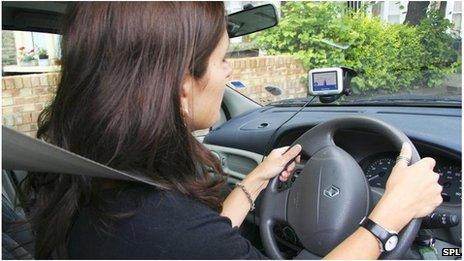David Nutt suggests alcohol sensors 'in every car'
- Published
- comments

Under Prof Nutt's proposal, all drivers would have to breathe into a device and be within the legal drink drive limit before their car would start
Alcohol sensors should be in every car to cut drink-related road deaths and injuries, says the government's former chief drugs adviser.
David Nutt says motorists would have to breathe into the devices before starting their car, to test they were not over the limit.
Prof Nutt was sacked from his post three years ago after clashing with Labour ministers over drugs policy.
<link> <caption>He later set up the Independent Scientific Committee on Drugs.</caption> <url href="http://news.bbc.co.uk/1/hi/uk/8461442.stm" platform="highweb"/> </link>
That body ranked alcohol as a more harmful substance than heroin and cocaine.
He also said people in the UK would be less inclined to get drunk if they were able to smoke cannabis at Amsterdam-style "cannabis cafes".
Alcohol suggestions
Prof Nutt, president of the British Neuroscience Association and a professor at Imperial College, London, said Britain was facing a "public health crisis" of "immense proportions" because of a rise in the number of alcohol-related illnesses and deaths.
Although he welcomed plans for minimum unit pricing in England, Wales and Scotland, saying it will have a "big impact" on heavy drinkers, Prof Nutt said much more must be done.
In his new book, Drugs - Without the Hot Air, he suggests seven ways to reduce the harm caused by alcohol.
They include shorter licensing hours, compelling pubs and supermarkets to sell non-alcoholic lagers and beers alongside alcoholic drinks and devising less dangerous alternatives such as drinks which give people a moderate "buzz".
One of his most controversial suggestions is for the "wider use" of alcohol detectors that won't allow cars to start if the driver's drunk more alcohol than the legal limit.
Prof Nutt told the BBC that some countries used the in-car breathalysers, known as alcohol ignition interlock devices, to ensure that people convicted of drink-driving don't take to the wheel, but he had an even more "radical" idea.
"You could potentially have it so that was true of all cars - everybody would have to breathe in [to the device] before they were able to drive away," he said.
"You hear about terrible accidents when four or five young people die simultaneously in the one car because the driver's been drunk. It could save a lot of lives."
'Worth investigating'
Provisional figures for 2010 show there were 250 drink-related road deaths in England, Wales and Scotland. A further 1,230 people were seriously injured and 8,220 were slightly hurt.
Robert Gifford, executive director of the Parliamentary Advisory Committee on Transport Safety, gave the idea a cautious welcome, but said it would have to go hand-in-hand with lowering the drink-drive limit from 80 mg/100 ml of blood.
"It's certainly worth investigating," Mr Gifford said.
But the Department for Transport said it had no plans to install in-car breathalysers in cars - or to use them to test drink-driving offenders.
A spokesman said: "These schemes are very difficult to manage because offenders can get round the lock by changing the car they drive. We are also not persuaded as to their effectiveness in changing long-term behaviour."
He added: "We are always willing to consider new initiatives to combat drink driving and of course would consider any new research or technology in this area."
Professor Nutt also re-iterated calls he has made previously for drugs to be decriminalised, saying there should be a system of "regulated access" from pharmacies.
Drug laws
He suggested establishing a network of coffee shops, similar to those which exist in the Netherlands where people can buy small quantities of cannabis for personal use.
"I've spoken to a lot of young people and they would prefer to go out and have a joint than get drunk - but they have no choice. "
He said if cannabis cafes were set up in Britain up to 25% would switch to smoking the drug rather than drinking alcohol, leading to less drunken behaviour and violence.
Prof Nutt is due to give evidence in June to the Home Affairs Select Committee, which is conducting a wide-ranging inquiry into the effectiveness of Britain's drugs policy including the arguments for decriminalisation.
But the Home Office has made clear on a number of occasions that it has no intention of liberalising the drugs laws.